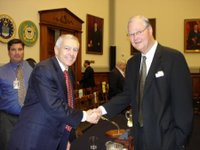 Rep. Ike Skelton said the conflict in Iraq has digressed into a civil war and that the United States should begin to gradually withdraw out of the country this year. Skelton made his comments on NBC's Meet the Press this morning, during a panel discussion about the future of the United States' role in Iraq.
Rep. Ike Skelton said the conflict in Iraq has digressed into a civil war and that the United States should begin to gradually withdraw out of the country this year. Skelton made his comments on NBC's Meet the Press this morning, during a panel discussion about the future of the United States' role in Iraq."Scholars will say no. I will say yes, because the violence is so heavy," Skelton said to Tim Russert, after the moderator pressed him on the civil war question.
"In true civil wars Tim, there is a political goal. There is a way to stop it and shake hands and put an end to it. The sectarian violence, the only purpose is killing each other," Skelton added. "But as far as peace and decorum is concerned, it's a civil war in my book."
Skelton also said the Iraq war will not be won until Iraqis are properly trained and begin to fight the battles themselves.
"I also think we're going to have to send a message to the Maliki government, the Iraqi people, as well as the American people that we are not there forever. And it is in the law that we redeploy this year. I would begin it this year," Skelton said.
Skelton's colleague on the House Armed Services Committee Rep. Duncan Hunter said the best strategy for victory is to "Go Iraqi." Hunter said the United States must send more of the 114 Iraqi battalions into the action.
Skelton said it is up to the United States to train and advise these brigades, and then gradually move U.S. troops out of the country. Skelton has a proposed a plan to redeploy one American brigade out of the country for every three Iraqi brigades that are trained and ready to fight.
"The problem has been, a lot of the trainers, and they are great Americans, but they were not trained to be trainers. That's what Special Forces do," Skelton said.
Russert noted and Skelton acknowledged that he has evolved in his thinking on the war. In December of 2005, Skelton rejected Democratic calls for a quick withdrawal from Iraq and said pulling out would leave the country "a snakepit for terrorists."
"Your thinking has changed," Russert asked Skelton.
"It has. The situation has changed," Skelton replied.
When asked how many U.S. troops will be in Iraq one year from now, Skelton shied away from a specific number. "I hope it's far less than what we have today," he said. "It's up to Iraqis to form their own future."
No comments:
Post a Comment